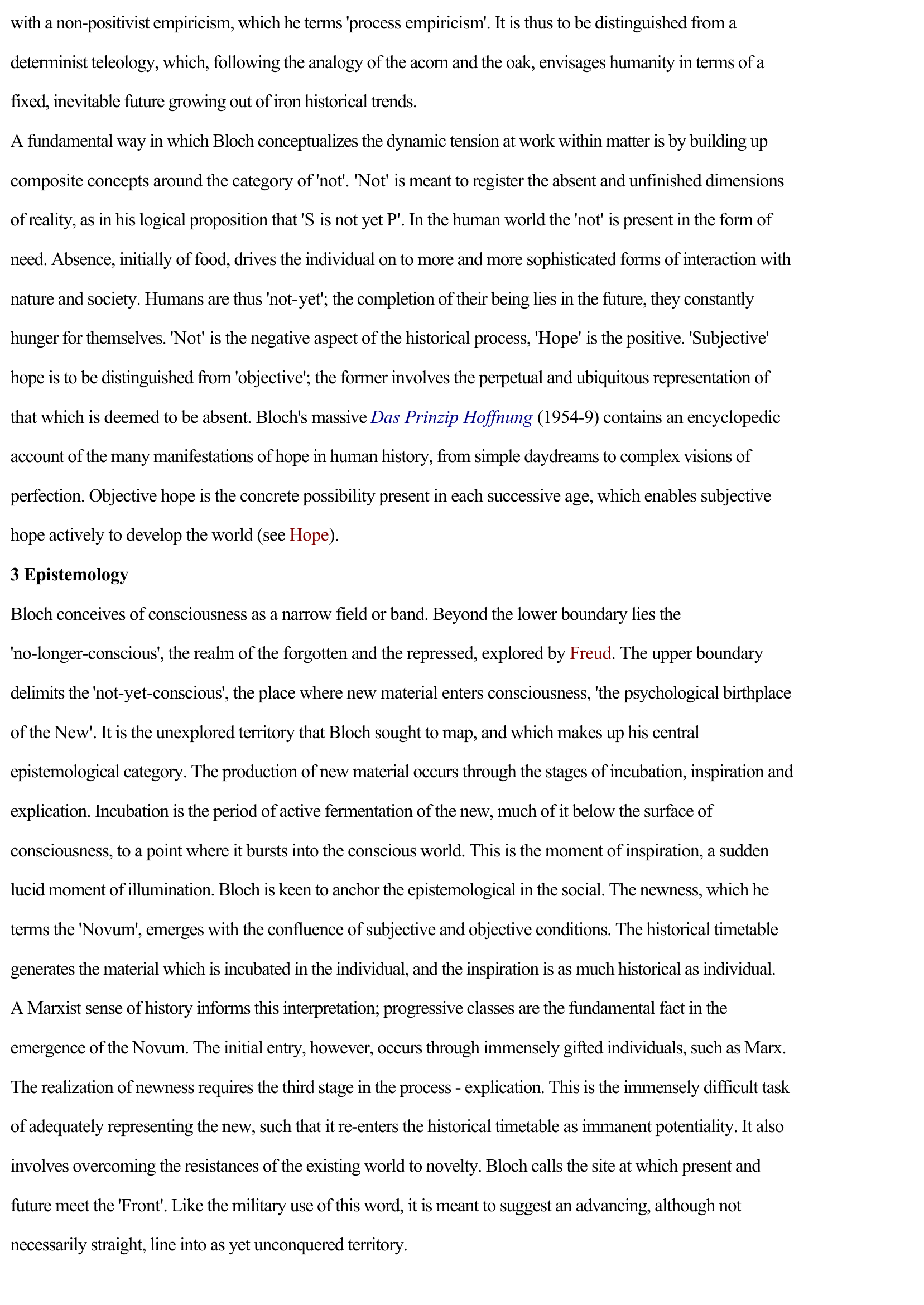Bloch, Ernst Simon
Publié le 22/02/2012

Extrait du document
«
with a non-positivist empiricism, which he terms 'process empiricism' .
It is thus to be distinguished from a
determinist teleology, which, following the analogy of the acorn and the oak, envisages humanity in terms of a
fixed, inevitable future growing out of iron historical trends.
A fundamental way in which Bloch conceptualizes the dynamic tension at work within matter is by building up
composite concepts around the category of 'not' .
'Not' is meant to register the absent and unfinished dimensions
of reality, as in his logical proposition that 'S is not yet P'.
In the human world the 'not' is present in the form of
need.
Absence, initially of food, drives the individual on to more and more sophisticated forms of interaction with
nature and society.
Humans are thus 'not -yet'; the completion of their being lies in the future, they constantly
hunger for themselves.
'Not' is the negative aspect of the historical process, 'Hope' is the positive.
'Subjective'
hope is to be distinguished from 'objective'; the former involves the perpetual and ubiquitous representation of
that which is deemed to be absent.
Bloch's massive Das Prinzip Hoffnung (1954-9) contains an encyclopedic
account of the many manifestations of hope in human history, from simple daydreams to complex visions of
perfection.
Objective hope is the concrete possibility present in each successive age, which enables subjective
hope actively to develop the world (see Hope ).
3 Epistemology
Bloch conceives of consciousness as a narrow field or band.
Beyond the lower boundary lies the
'no-longer- conscious' , the realm of the forgotten and the repressed, explored by Freud .
The upper boundary
delimits the 'not -yet- conscious' , the place where new material enters consciousness, 'the psychological birthplace
of the New' .
It is the unexplored territory that Bloch sought to map, and which makes up his central
epistemological category.
The production of new material occurs through the stages of incubation, inspiration and
explication.
Incubation is the period of active fermentation of the new, much of it below the surface of
consciousness, to a point where it bursts into the conscious world.
This is the moment of inspiration, a sudden
lucid moment of illumination.
Bloch is keen to anchor the epistemological in the social.
The newness, which he
terms the 'Novum' , emerges with the confluence of subjective and objective conditions.
The historical timetable
generates the material which is incubated in the individual, and the inspiration is as much historical as individual.
A Marxist sense of history informs this interpretation; progressive classes are the fundamental fact in the
emergence of the Novum.
The initial entry, however, occurs through immensely gifted individuals, such as Marx.
The realization of newness requires the third stage in the process - explication.
This is the immensely difficult task
of adequately representing the new, such that it re-enters the historical timetable as immanent potentiality.
It also
involves overcoming the resistances of the existing world to novelty.
Bloch calls the site at which present and
future meet the 'Front' .
Like the military use of this word, it is meant to suggest an advancing, although not
necessarily straight, line into as yet unconquered territory..
»
↓↓↓ APERÇU DU DOCUMENT ↓↓↓
Liens utiles
- ESPRIT DE L’UTOPIE (L’), Geist der Utopie, 1918. Ernst Bloch
- PRINCIPE DE L’ESPOIR Ernst Bloch (résumé)
- Le Principe Espérance Ernst Bloch (résumé)
- PRINCIPE ESPÉRANCE (LE), Ernst Bloch
- THOMAS MÜNZER, THÉOLOGIEN DE LA RÉVOLUTION Ernst Bloch (résumé & analyse)

































